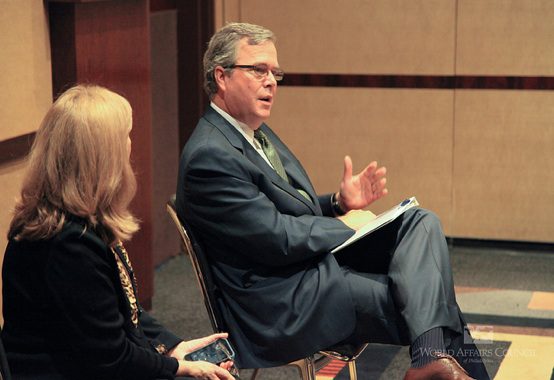Bush Intends to Follow Romney’s Lead on Foreign Policy

Jeb Bush is taking some flack over his list of foreign policy advisers:
But there’s a real down side for Bush in naming so many brain-trust members so early, several GOP former officials told me. For one thing, by listing several people who fundamentally disagree on major issues, Bush may be setting up a team that is perpetually in conflict. For example, Robert Zoellick, the former U.S. trade representative, and Paul Wolfowitz, the former deputy secretary of defense, are unlikely to see eye to eye on much. Potential voters could also be confused by a team that has no clear ideological identity, especially one advising a candidate who has little to no foreign policy experience.
I suppose that could be a problem with a few voters, but the more glaring problem with Bush’s list is the fact that most of the people on it were prominent officials in the last Bush administration. Whatever the differences some may have with one another, the message that Bush’s list of advisers sends is one of overall continuity with his brother’s administration. He said nothing in his speech earlier today to disabuse anyone of this notion. More to the point, the differences between these advisers are not always as great or as “fundamental” as they are imagined to be. Take Zoellick and Wolfowitz, for example. Zoellick is frequently mentioned as if he were a paragon of the Republican realist tradition, and according to this view he should be seen as someone sharply at odds with neoconservatives and other hard-liners in the party. Yet Zoellick and Wolfowitz were signatories of an early Project for the New American Century (PNAC) letter urging regime change in Iraq. Bush had earlier signed off on PNAC’s statement of principles. How fundamental can their disagreements really be when both of them agreed on one of the worst policies of the last forty years? Romney also tried to some extent to bring in many foreign policy advisers from different wings of the party, but the inclusion of many of them was just for show. Romney was notorious for ignoring a lot of his advisers during the campaign, and when he did listen to him them he consistently sided with the hard-liners. That didn’t work out well for Romney, and it won’t work out any better for Bush.
Rogin goes on to say that Bush is expected to imitate the Romney campaign’s overall approach to foreign policy from 2012:
As a former governor, Bush cannot run on his foreign policy credentials, so he is expected to follow the basic path that Romney used successfully to cut his national security deficit with Obama in 2012 [bold mine-DL]. He will criticize Obama’s policies as failures, promote a stronger and more assertive American foreign policy, and avoid outlining specific remedies for complicated problems as much as possible [bold mine-DL].
This is bizarre. The worst thing Bush could do would be to copy Romney’s handling of these issues. Romney never reduced his disadvantage on these issues during the campaign. On the contrary, he routinely made a fool of himself, and he became a caricature of a hard-liner in the process. If that is what Bush is expected to do, he is opening himself up to constant and damaging criticism. I’m sure that Bush would like to avoid having to outline “specific remedies” as much as he can, but there’s no reason why he should be trusted with the nomination, much less the presidency, if he cannot articulate how he would handle major issues differently and why his preferred policies would be more successful.
Comments